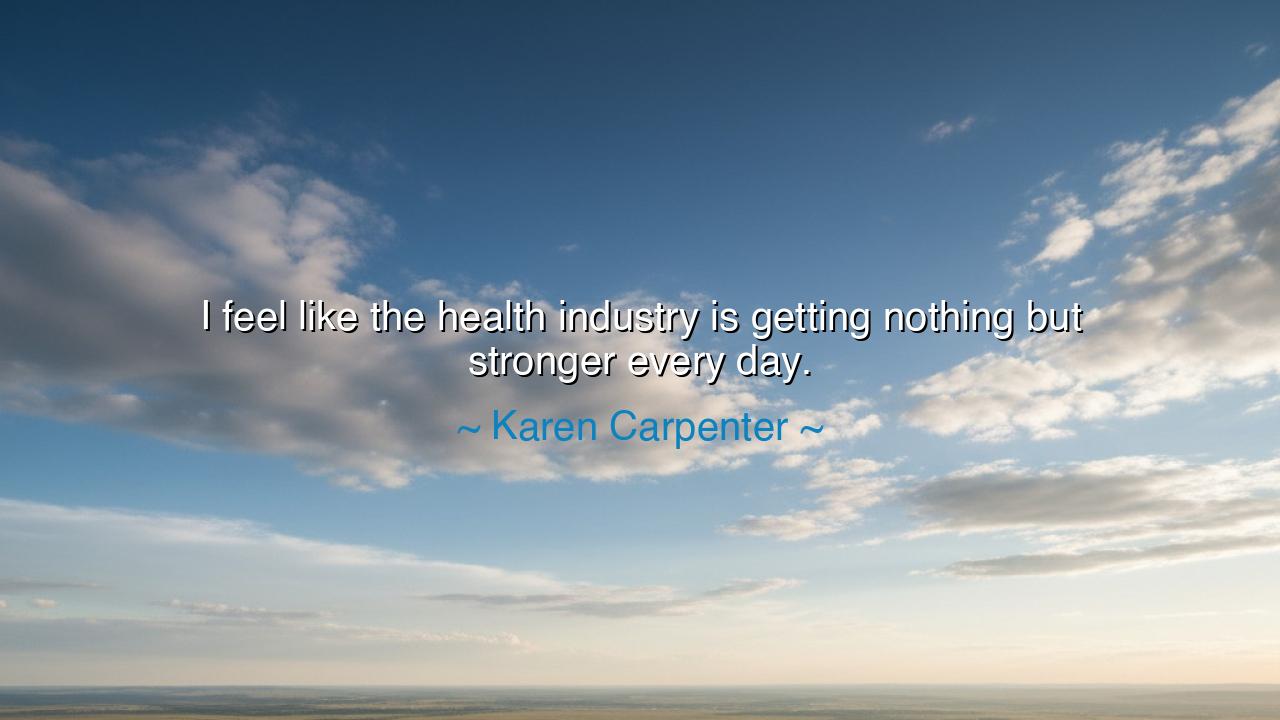
I feel like the health industry is getting nothing but stronger






“I feel like the health industry is getting nothing but stronger every day.” These words of Karen Carpenter, the beloved singer whose voice once carried both tenderness and tragedy, resonate with an irony that cuts deep into the human heart. For in her frail and gentle frame was a soul that suffered quietly under the weight of society’s illusions about beauty and perfection. When she spoke these words, she was not celebrating the triumph of healing, but observing with bitter insight how the industry of health — meant to save lives — had become a powerful, self-sustaining force, often more concerned with growth than with true wellness. In her voice, we hear both recognition and lament — a reflection on how humanity’s pursuit of health had turned into a system of profit and pressure, feeding on the very insecurities it claims to cure.
The irony of her words is illuminated by the tragedy of her life. Karen Carpenter, gifted with an angelic voice, fell victim to anorexia nervosa, a disease that was barely understood in her time. Her suffering revealed not only the fragility of one soul, but the sickness within a culture that worshiped thinness over vitality, image over truth. When she spoke of the “health industry” growing stronger, it was a whisper of disillusionment — an observation that the business of wellness had grown mighty, even as individuals like her grew weaker beneath its gaze. The industry flourished, but the human spirit languished. In her pain, she saw what many still fail to see: that a system can prosper while the people it serves decline.
From the earliest civilizations, humanity has sought mastery over illness and the frailty of the flesh. The physicians of Ancient Greece, followers of Hippocrates, built their art upon harmony — the balance between body and spirit, nature and nourishment. But as centuries passed, the sacred art of healing became an empire of commerce. The health industry, once a servant of humanity, began to rule it. What began as a mission to mend became, for some, a market to exploit. Medicines became products; wellness became branding; and the ancient wisdom of balance was overshadowed by the glitter of profit. Karen’s words, though simple, carry the weight of this transformation — they speak of a world where the power of health care grows, yet the meaning of health itself diminishes.
Her life serves as a parable for this truth. When she sought help for her illness, she found herself surrounded by experts, yet starved for understanding. She was measured, prescribed, and analyzed, but not healed. The machinery of medicine was vast and efficient, yet the human soul — fragile and complex — was left unseen. Her passing, at the tender age of thirty-two, became a mirror for society, forcing the world to confront the question: How can the health industry grow stronger while hearts grow weaker? The answer, as the ancients would say, lies not in power, but in purpose. For the strength of an institution means nothing if it forgets the spirit it was meant to protect.
We might compare her insight to that of Florence Nightingale, who once stood amidst the filth and chaos of the Crimean War and declared that hospitals were meant to be sanctuaries, not factories. She too saw how systems grow — but not always in virtue. Nightingale, through compassion and reform, brought the art of care back to its human core. In her, as in Karen’s lament, we find the same yearning: that the power of healing should never outpace the tenderness of the healer. For when compassion wanes and profit reigns, the body may survive — but the soul of medicine withers.
Yet within Karen’s sorrow lies also a prophecy of hope. For if the health industry grows stronger, then so too does the opportunity for it to rediscover its true purpose. Strength, after all, is neither good nor evil; it is the tool of whoever wields it. If humanity can awaken — if doctors, nurses, and healers remember that behind every diagnosis beats a living heart — then this strength can be turned to good. The industry may yet evolve, as the ancients once dreamed, into a guardian of both body and soul. But that transformation begins not in laboratories or boardrooms, but in conscience — in the collective decision to see patients not as numbers, but as sacred lives.
Therefore, O listener, take this lesson from the voice of one who sang beauty yet suffered in silence: true health is not found in systems or medicines alone, but in compassion, balance, and self-understanding. Guard your heart from the illusions of perfection; seek harmony over appearance. When you pursue health, let it be in spirit as much as in body. And when you speak of healing, let your words be gentle, for they may touch a wounded soul. The strength of the health industry may grow with time, but let us ensure that its growth is not merely of wealth and walls — but of wisdom, mercy, and love.
Thus, in remembering Karen Carpenter’s words, we are reminded of the ancient truth: that power without compassion becomes corruption, and that every true healer must look first not to the chart, but to the eyes of the one in need. Only then will the health of the world — like a song once silenced — rise again, pure, whole, and everlasting.






AAdministratorAdministrator
Welcome, honored guests. Please leave a comment, we will respond soon